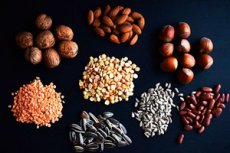Medical expert of the article
New publications
Sunflower and pumpkin seeds in pancreatitis
Last reviewed: 03.07.2025

All iLive content is medically reviewed or fact checked to ensure as much factual accuracy as possible.
We have strict sourcing guidelines and only link to reputable media sites, academic research institutions and, whenever possible, medically peer reviewed studies. Note that the numbers in parentheses ([1], [2], etc.) are clickable links to these studies.
If you feel that any of our content is inaccurate, out-of-date, or otherwise questionable, please select it and press Ctrl + Enter.

Although sunflower seeds are not a staple food, they have quite a few fans who like to click on them in their spare time. Pancreatitis imposes certain restrictions on a person's diet, sometimes forcing them to sit on a strict diet for a long time during exacerbations of the disease, so you have to weigh the benefits and harms of each product for the pancreas. A special dietary table No. 5 has been developed, which you need to focus on. Is it possible to eat sunflower seeds with pancreatitis?
 [ 1 ]
[ 1 ]
Can you eat seeds if you have pancreatitis?
In order for the food that has entered the body to be broken down into simpler compounds that can penetrate the bloodstream through the intestinal mucosa, deliver nutrients to all organs and ensure metabolism, enzymes are needed. This function lies with the pancreas, and its disruption leads to inflammation of the organ, accompanied by painful symptoms and necrosis of its tissues. The disease spoils the quality of life, and often ends with dangerous consequences and even death. The lion's share of the therapeutic effect of the disease depends on nutrition.
What to eat with pancreatitis? It is recommended to eat frequently and in small portions. It includes lean meat, fish, cereals in water or low-fat milk, pasta, occasionally soft-boiled eggs, boiled or baked vegetables, compotes and fruit jelly, white slightly dried bread. Small amounts of seeds are not prohibited, but with certain reservations. Thus, fried seeds are strictly contraindicated, since this method of heat treatment is unacceptable for pancreatitis, in addition, they are very fatty and high in calories, so more pancreatic juice will be needed to digest them, which means the load on the organ will increase. Their effect on the liver, which has problems or gallstones, is also negative: a sharp activation of bile can cause an attack.
What seeds can be eaten with pancreatitis?
Despite such extensive beneficial properties of seeds, due to their high fat content, they are limited in case of pancreatitis. Fried ones are completely taboo. Raw or slightly dried ones in a state of stable remission can be eaten in small quantities. Acute pancreatitis or exacerbation of chronic also imposes a complete ban on them. If you still allow yourself to nibble on them, it is best to buy unpeeled ones, clean them yourself and dry them in the oven.
Sunflower seeds for chronic pancreatitis and cholecystitis
These diseases often accompany each other, although they involve different organs. Cholecystitis means inflammation of the gallbladder, during which bile often refluxes into the pancreas. Their symptoms are similar in many ways, and the treatment of both largely depends on diet. Exacerbation of pathologies does not allow seeds in the diet, and fried ones are excluded altogether in any form.
Chronic cholecystitis, although it makes a relaxation in the rules of nutrition, still does not provide complete freedom of choice. Fried, spicy, fatty, marinated, smoked foods are still strictly prohibited, but a couple of spoons of raw peeled seeds are allowed due to their usefulness.
Benefits of seeds
We have two types that are predominantly common: sunflower and pumpkin. Let's look at the benefits of each:
- Sunflower seeds are rich in vitamin D, in this they are even ahead of cod liver. With its help, the acid-base balance of the body is normalized, the condition of the mucous membrane, skin, hair, nails is improved. Vitamin A improves visual acuity, E is a well-known antioxidant - it prevents the destruction of cell membranes and protects them from toxic effects. Seeds are a storehouse of unsaturated fatty acids: stearic, linoleic, oleic, palmitic, etc. They prevent the formation of "bad" cholesterol, clogging of blood vessels with plaques. Tannins, carbohydrates, organic acids are also present. Many minerals, the most significant are phosphorus, magnesium, zinc, potassium. The latter is 5 times more than in the same weight of banana;
- pumpkin seeds - they are considered healthier than sunflower seeds. Due to their vitamin and mineral composition, they remove heavy metals from the body, are used in the treatment of the urinary tract and kidneys, and are an anthelmintic. They increase immunity, potency in men, fight joint diseases, and strengthen blood vessels. One hundred grams of seeds completely replace the daily requirement for amino acids, manganese, 73% - for vitamin PP, 153% phosphorus, 148% magnesium.
Contraindications
Sunflower seeds can be an allergen, so they are contraindicated in case of hypersensitivity to them. Fields along roads are dangerous due to the accumulation of toxic substances in the seeds, especially cadmium, a metal that is dangerous for the kidneys and nervous system. It is best to grow sunflowers in your own dachas. People who are overweight or have a sore throat should not eat them. Dentists also warn about the harm of peeling the seeds to your teeth.

